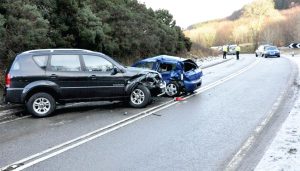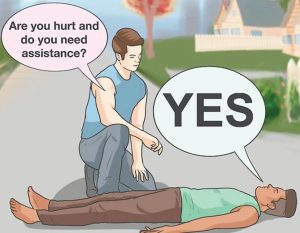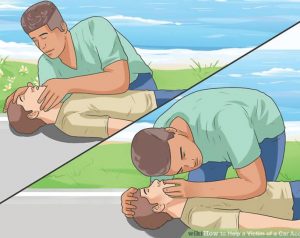 TrustLaw Supports SaveLife Foundation to Protect First Responders at Road Accidents
TrustLaw Supports SaveLife Foundation to Protect First Responders at Road Accidents
Road accidents have emerged as a major public health problem globally, and more so in India where 5 lakh road accidents are reported in the country every year. Will new legislation help reduce India’s sky-high rate of road fatalities?
A staggering 17 people an hour on average are killed on India’s roads. The country has the highest number of road accident casualties in the world–more than 1.34 million lives have been lost in the past decade.
Yet 50 percent of these deaths could have been prevented, according to estimates by the Law Commission of India, if passers-by were less hesitant in providing immediate assistance.

In the absence of established emergency medical services, ‘Good Samaritans’ can play a game-changing role in saving lives. But a national study conducted by SaveLIFE Foundation (SLF), an NGO dedicated to improving road safety and emergency care in India, has revealed that three out of four people are reluctant to offer help to road victims for fear of repercussions.
Procedural hurdles, unnecessary police questioning and legal issues are all preventing by standers from offering vital aid.
In response to this alarming issue, TrustLaw, the Thomson Reuters Foundation’s pro bono legal programme, produced a comparative study of Good Samaritan laws in Europe, the US and Asia, to support SLF in its advocacy efforts to pass new legislation in India and protect first responders to road accidents.

In 2012, SLF filed a Writ Petition in the Supreme Court of India, seeking a framework for protection of Good Samaritans to safeguard bystanders and passersby from police harassment, detention at hospitals and prolonged court proceedings. The following year, TrustLaw connected SLF to lawyers from Dechert, Carrington, Coleman, Sloman & Blumenthal and Intel, to conduct a review of best practice legislations in England and Wales, France, China and the US as a basis for a Good Samaritan model law for India.
The report found that all these countries offer civil and/or criminal liability protection for first responders to victims of road accidents provided that the requisite statutory requirements are met.
This formed the basis of SLF’s advocacy for legal reform within India’s constitutional framework, strengthened the NGO’s case with policymakers,parliamentarians and Supreme Court judges, and helped inform and influence public opinion.
“In January 2016, the government released a set of Standard Operating Procedures (SOPs) for law enforcement agencies and the judiciary to ensure fair and just treatment of Good Samaritans during police and court procedures. The SOPs called for formal compensation and reward schemes for bystanders, and put a strict ban on any form of intimidation or harassment. On March 30, 2016, the Supreme Court delivered a landmark decision that made the guidelines and SOPs legally binding on all States and Union Territories of India”
Following extensive advocacy efforts, including a petition to the Health Minister of India, a Private Member Bill in Parliament and a national consultation in May 2015, the Government published detailed guidelines on the protection of Good Samaritans. Legal safeguards included the right to anonymity, immunity from civil or criminal liabilities and protection from having hospital costs forced upon them if the victim is unable to foot the bill.
 In January 2016, the government released a set of Standard Operating Procedures (SOPs) for law enforcement agencies and the judiciary to ensure fair and just treatment of Good Samaritans during police and court procedures. The SOPs called for formal compensation and reward schemes for bystanders, and put a strict ban on any form of intimidation or harassment. On March 30, 2016, the Supreme Court delivered a landmark decision that made the guidelines and SOPs legally binding on all States and Union Territories of India.
In January 2016, the government released a set of Standard Operating Procedures (SOPs) for law enforcement agencies and the judiciary to ensure fair and just treatment of Good Samaritans during police and court procedures. The SOPs called for formal compensation and reward schemes for bystanders, and put a strict ban on any form of intimidation or harassment. On March 30, 2016, the Supreme Court delivered a landmark decision that made the guidelines and SOPs legally binding on all States and Union Territories of India.
Karnataka was the first State to give legislative backing to the court judgment and enshrine the Good Samaritan guidelines into law. In November 2016, the Legislative Assembly approved the Karnataka Good Samaritan and Medical Professional (Protection and Regulation during Emergency Situations) Bill, which is now waiting for the President of India’s assent. The Bill offers unprecedented protection to both first responders to road accidents, and medical professionals.
“The new law is just the first step on the long and winding road to ensure that no life is lost for want of basic life-saving care,” says Piyush Tewari, Founder & CEO of SaveLIFE Foundation. “We are continuing our advocacy work to make sure that the Supreme Court judgment is implemented across the country and at the same time, we are working with more States to enact State-specific Good Samaritan Law.”
Trust Law does not only facilitate cross-border legal research-our pro bono legal programme assists with a wide array of legal issues, ranging from day-to-day transactional matters to multi jurisdictional research projects.
 We have supported grassroots organisations to employ their first staff members, helped vulnerable women access loans to start their first businesses and brought renewable energy lighting to slums. Free legal assistance on these projects has made a significant impact on local communities working to overcome poverty and discrimination.
We have supported grassroots organisations to employ their first staff members, helped vulnerable women access loans to start their first businesses and brought renewable energy lighting to slums. Free legal assistance on these projects has made a significant impact on local communities working to overcome poverty and discrimination.
In addition, NGOs and social enterprises can now use the TrustLaw Legal Health Check to identify legal matters relevant to their organisation and spot issues on which legal advice might be needed. The checklist covers a broad spectrum of legal topics, from setting up a new legal entity and understanding obligations towards employees, to protecting ideas and branding.
Ensuring that an organisation is healthy will save time and resources in the future-helping non-profits streamline their operations, maximise funding opportunities and scale their impact.
Trust Law is the Thomson Reuters Foundation’s global pro bono legal programme. We connect the world’s leading legal teams with high-impact NGOs and social enterprises working to create social change. Our research programmes are powerful advocacy tools that help our members achieve legal and policy reforms and improve the rule of law.
Trang Chu Minh is Community Engagement Officer with TrustLaw, the Thomson Reuters Foundation’s pro bono legal programme. Based out of London, Trang has a global responsibility developing and executing communications strategy and campaigns targeted at TrustLaw’s network of legal experts, NGOs and social enterprises across 175 countries.
Devyani Kacker is a Legal Officer for the South Asia region with TrustLaw. She handles the pro bono legal projects from TrustLaw’s community of NGOs and social enterprises, frames and defines the projects, and then connects them with lawyers. She also manages cross-border research and policy advisory programmes that address the most critical needs facing our NGO and social enterprise members.

